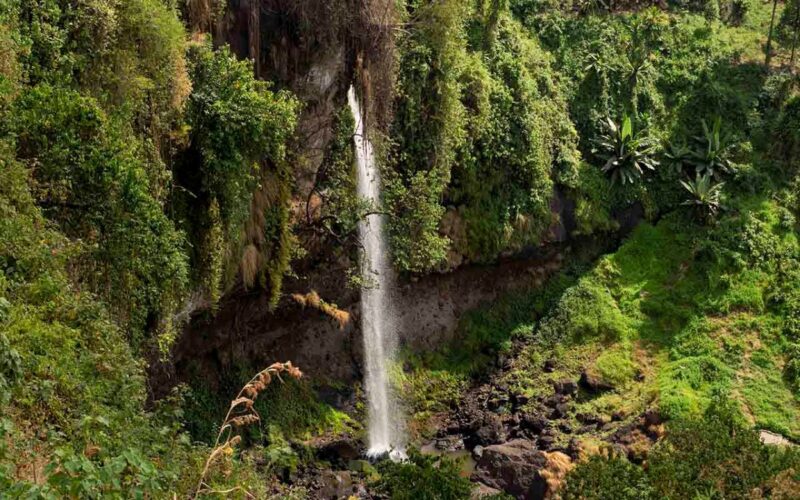Rising to 4321m at Wagagia peak, Mount Elgon is the 8th highest mountain in Africa and the largest free-standing mountain with the broadest base of over 80km. Straddling along the Uganda/Kenya borderline, Mount Elgon boasts a diversity of unspoiled beauty, numerous waterfalls, and the widest caldera on its peak, stretching 8 km wide. Designated as a Man and Biosphere reserve by UNESCO in 2003, Mount Elgon’s higher ranges above the 2000m contour line are protected as a national park due to their ecological importance and natural beauty. The heavily populated lower slopes are predominantly occupied by a mix of cultures of the Bagisu and the Sebei.
Hiking Guide to Mount Elgon
Mount Elgon offers an excellent hiking/trekking adventure experience to its various panoramic peaks from its trailheads of Kapakwai, Budadili, Kapkwata and Bushiyi. From these starting points, hiking trips ranging from 2-6 Days are tailored including to summit Wagagia peak at 4321m, to hot springs or combine a return hike via another trailhead. Mount Elgon attracts low number of visitors meaning that you will probably have the mountains on your own, making it a personal adventure.
A hike experience on Mount Elgon is logistically and technically easy when compared to other East African mountains, where its mild climate and lower elevation present a low risk of altitude sickness. That said, anyone with reasonable fitness can undertake this unforgettable adventure.
Hiking Trails and Trailheads on Mount Elgon
Day Hike Tours at Kapkwai Forest Exploration Centre on Mount Elgon
Kapkwai Exploration Centre is the most accessible park trailhead, lying on the western slopes of Mount Elgon, some 70 km from Mbale and only 6km beyond Sipi. The trailhead of Kapkwai is also the main trailhead of the multi-day Sipi Trail to the 4321m Wagagai peak on Mount Elgon.
Hikers and trekkers with little or short time on their hands, Kapkwai Forest Exploration Centre (2050m) offers various rewarding day hiking adventures where you explore montane vegetational types and scenic routes. Trails at Kapakwai range from moderate to difficult, exploring a diverse Afro-montane and bamboo forest teeming with excellent birdlife and a diversity of primates extending to scenic waterfalls, gorges, and scenic viewpoints.
Day hiking trails from Kapkwai Forest Exploration Centre include;
- The Mountain Bamboo Loop Trail is 7 km long, requiring up to 4 hours, and great for bird enthusiasts.
- Chebonet Falls Loop Trail is 5 km long, requiring up to 3 hours, where the highlight is beautiful waterfalls past areas of montane and bamboo forest.
- The Ridge Hiking Loop Trail: 3 km long, requiring up to 2 hrs
Multi-Day Hiking Trails to Wagagai Peak (4321 m) on Mt. Elgon
Bushiyi Trail
- Trailhead Bushiyi 1900m
- Access point: Bududa
- Duration: 2-3 Days
- Distance to the peak: 20 km each way
Sasa Trail
- Trailhead Bugiboni base at 1520m
- Access point: Budadili (1250m)
- Duration: 4 Days
- Distance to the peak: 22 km one way
Piswa Trail
- Trailhead: New trailhead at Kapkwata 2190m
- Access point: Kapkwata camp, 2050m
- Duration: 2-3 Days
- Distance to the peak: 30 km each way
Sipi Trail
- Trailhead Kapkwai Exploration Centre 2050m
- Duration: 4-5 days
- Access point: Sipi Village
- Distance to the peak: 41 km each way
Example Itinerary: 4-Day Hiking to Wagagi Peak at 4321m on Sasa Trail
- Day One: Sasa River Camp, 2900m, 6-8 hr walk
- Day Two: hike to Mude Caves, 3500m 4-5 hr walk while here, ascend to Jackson’s peak summit (Masaba mount), 4165 m, where the round trip is about 5 hrs.
- Day Three: Ascend to Wagagai peaks at 4321m and back to Mude caves. 8-9 hrs
- Day Four: Descend to Budadili (1250m) starting point
Best time to hike Mount Elgon
The best time to hike Mt. Elgon is during the dry months of June to August and from late November to March. That said, even in the dry month, expect some rain, so ample clothing is required.
Hiking Guide to Mount Elgon – Essential Packing List
- Prescribed high-altitude sickness meds
- Carry plenty of safe drinking water.
- Warm long-sleeved shirts and trousers It gets chilly on these mountains, especially in the evenings.
- Mountain boots are essential, at least the ones you have actually used before.
- Chocolate/sugar bars or any of your favorite dried foods are essential for the energy boost while on the trek.
- Waterproof jackets and trousers
- Thermal gloves
- Have some plastic bags to store wet clothing in.
- Sunglasses
- Wool hat
- Sun scream
- Head torch and spare batteries
- At least 2 extra pairs of warm socks

